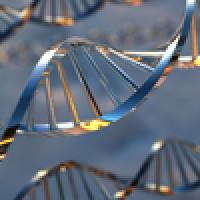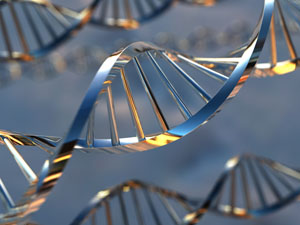
Gene-ius

A team of scientists have embarked on the first-ever rigorous search for a maths gene. Simon Baron-Cohen, Lindsey Kent, Carrie Allison, Alex Pollitt and Sally Wheelwright, all from the Autism Research Centre at the University of Cambridge, want to search the DNA of 200 pairs of siblings for clues about what makes a good mathematician - and you might be able to help them.
According to popular belief, mathematical ability is something people are born with, and those who have it often exhibit other peculiar characteristics. Generations of school teachers and university professors have observed that maths often runs in the family. Being good at maths frequently seems to go hand in hand with a lack of social skills, and people with autism not only struggle with their social skills, but may also show extremely high mathematical ability.
But are genes responsible for these connections, or are they due to nurture rather than nature? Growing up in a mathematically minded family is bound to make you feel drawn to - or at least not afraid of - the subject. Doing maths is a solitary business and introverted people might be drawn to it early on, while sociable extroverts might simply not have the time to pursue it.
In an attempt to answer this question, the Cambridge scientists want to consider the genes of pairs of siblings who have both obtained an A grade at maths A level. On average, siblings share about 50% of their genes. If the scientists come across genes which are shared significantly more often than 50% of the time, then those genes may be responsible for the shared maths ability. The candidate genes, if they are found, could then be subjected to further tests to see whether they really are connected to mathematical ability, or autism, or both.
So far, the team has collected data from 140 sibling pairs. You can volunteer to be among the remaining 60 by going to the maths gene project website. You and your sibling - remember you must both have an A at maths A level - will be asked to perform an online maths test and to send in a cheek swab by post. The DNA will be stored anonymously and the experiment is approved by the University Ethics Committee.
Genetic research always throws up difficult ethical questions. Some people fear that the knowledge gained might in the future be used for genetic engineering and that people with the "wrong" genetic make up might be downgraded to second-class human beings. But, as ever, knowledge is only dangerous when it is in the wrong hands, and there are many positive things to be gained from the research. Understanding mathematical ability, and where it comes from, can help improve maths education and support those who struggle with it. Being unable to get to grips with basic maths can be a huge handicap in people's lives. If those that are likely to struggle are identified early on, provisions can be made so that they don't get left behind at school.
And knowledge of a maths gene, if it indeed exists, may give insights into how mathematically gifted people see the world and may help us understand the mysteries of autism. Who knows, we might even understand why so many mathematicians suffer from a bad dress sense.
Further Reading
- Read about maths, psychology and genetics in the Plus articles Maths on the brain, Natural born mathematicians and Speechless maths.